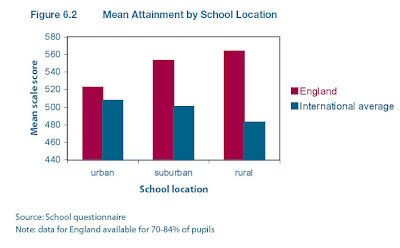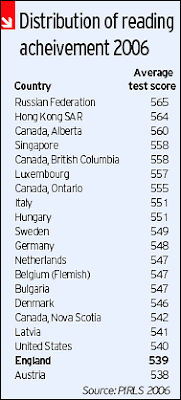According to the Progress in International Reading Literacy Study (PIRLS), English primary school pupils have slumped in the international league table of reading skills. The authoritative study of 40 countries showed them falling from third place in 2001 to 19th place in 2006.
Yesterday Ed Balls blamed parents for allowing their kids to play computer games:
“Across the country we should be getting our kids to play computer games a bit less and to read a bit more. Most of them have their own TVs and mobiles, and 37 per cent are playing computer games for three hours or more a day."
You can't trust those parents with anything, can you. Thank goodness they're not allowed school vouchers.
But there were some very interesting bits in the PIRLS report that never made the headlines.
To start with, when Balls goes on about computers, he overlooks the fact that it was his government that really pushed computers into schools. One result is that they are now widely used in teaching reading: PIRLS says 32% of English pupils now regularly use school computers for reading lessons, three times the international average of 11% (table 6.6). Many experienced teachers always reckoned that unfashionable traditional methods involving human beings were far more effective. But the Commissars knew better.
And also according to PIRLS, most of those hopeless parents actually seem to do a cracking job in preparing their children for school. In England, 56% of primary children attend schools where at least 75% of them enter with good basic literacy skills. That's nearly three times the international average of 20%.
So how come they enter school with good literacy skills? Could it by any chance be down to the parents at home?
The big picture seems to be that most parents do a pretty good job with their kids up to school age. They then have to consign their heirs to schools which do a relatively worse job now than they did five years ago.
Brilliant.
Of course, there is another theory about why our schools are performing worse than they used to in teaching reading. And it's a factor not mentioned in the PIRLS report, or the mainstream media coverage.
According to Schools Minister Jim Knight, there are now three-quarters of a million immigrant children in English schools. And many of them do not have English as a first language. Worse, in places like Slough, increasing numbers can't even speak English when they first arrive in the classroom.
Which may go some way to explaining why PIRLS finds our rural schools performing so much better than our urban schools. A pattern which is the exact reverse of experience in other countries:
Yesterday Ed Balls blamed parents for allowing their kids to play computer games:
“Across the country we should be getting our kids to play computer games a bit less and to read a bit more. Most of them have their own TVs and mobiles, and 37 per cent are playing computer games for three hours or more a day."
You can't trust those parents with anything, can you. Thank goodness they're not allowed school vouchers.
But there were some very interesting bits in the PIRLS report that never made the headlines.
To start with, when Balls goes on about computers, he overlooks the fact that it was his government that really pushed computers into schools. One result is that they are now widely used in teaching reading: PIRLS says 32% of English pupils now regularly use school computers for reading lessons, three times the international average of 11% (table 6.6). Many experienced teachers always reckoned that unfashionable traditional methods involving human beings were far more effective. But the Commissars knew better.
And also according to PIRLS, most of those hopeless parents actually seem to do a cracking job in preparing their children for school. In England, 56% of primary children attend schools where at least 75% of them enter with good basic literacy skills. That's nearly three times the international average of 20%.
So how come they enter school with good literacy skills? Could it by any chance be down to the parents at home?
The big picture seems to be that most parents do a pretty good job with their kids up to school age. They then have to consign their heirs to schools which do a relatively worse job now than they did five years ago.
Brilliant.
Of course, there is another theory about why our schools are performing worse than they used to in teaching reading. And it's a factor not mentioned in the PIRLS report, or the mainstream media coverage.
According to Schools Minister Jim Knight, there are now three-quarters of a million immigrant children in English schools. And many of them do not have English as a first language. Worse, in places like Slough, increasing numbers can't even speak English when they first arrive in the classroom.
Which may go some way to explaining why PIRLS finds our rural schools performing so much better than our urban schools. A pattern which is the exact reverse of experience in other countries:

Of course, the mass immigration of the last ten years was also the result of government policy.
